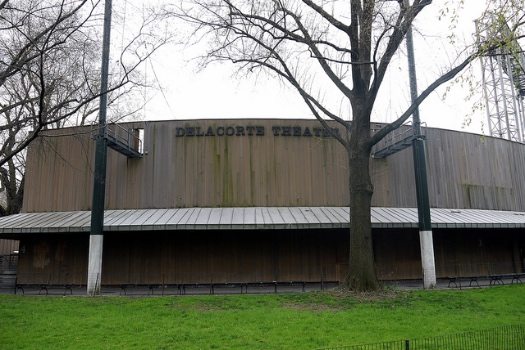
June 11, 2017; New York Times
The Delacorte Theatre lost two of its major sponsors for Shakespeare in the Park this year when it staged a production of Julius Caesar that showed the murder of a Trump-like leader. The controversy has built quickly over the past few days, demanding answers to questions about free speech, political art, and donor-grantee relations.
Delacorte chose to stage Julius Caesar with a blond, bombastic Caesar in a suit and a Slavic Calpurnia. Critic Jesse Green described the set as “timeless imperial imagery with pointed American allusions.” This would be inflammatory enough for some audiences, but rather than simply displaying the cloak rent by 33 daggers, Marc Antony brandishes the bloody corpse, further offending some viewers.
The backlash for this performance has caused both Bank of America and Delta to pull their sponsorships of the production. In a statement, Delta said the production “does not reflect Delta Airlines’ values.” The play’s “artistic and creative direction crossed the line on the standards of good taste,” a spokeswoman wrote. Other viewers took issue with the implied criticism and assassination of President Trump.
The New York Times chose to retain their sponsorship, saying, “We have sponsored Shakespeare in the Park for 20 years. As an institution that believes in free speech for the arts as well as the media, we support the right of the Public Theater to stage the production as they chose.”
Art is political, and the tradition of staging Shakespeare’s plays as a form of contemporary political commentary is a long one. Works like Richard III and Henry V were vehicles of political manipulation from the moment the first actor’s feet touched the stage, so while Delacorte Theatre may have gone a bit extreme in representation, the basic premise of their work is not unusual. The question in this situation has to do with their handling of sponsor relationships and any obligations those might entail.
Sign up for our free newsletters
Subscribe to NPQ's newsletters to have our top stories delivered directly to your inbox.
By signing up, you agree to our privacy policy and terms of use, and to receive messages from NPQ and our partners.
Donor-grantee relations are value statements, and it is not legal or advisable to force Delta or Bank of America to support organizations that run contrary to their values. If money is speech (and so says the Supreme Court of the United States), then it must be freely given and freely taken away. This link between sponsorship and values has popped up elsewhere in the sector: when museums faced protests for accepting money from oil companies, when students pressure universities to divest from coal interests, and when Muslim organizations turned down federal funding this year, fearing it would obligate them to cooperate in anti-immigration work. The value tie works both ways.
This isn’t to say the production should not be staged, only that Delacorte Theatre needs sponsors that are more informed about and aligned with its values. As Erin Eva Butcher, founder of Maiden Phoenix Theatre Company, pointed out, “It is not the job of art to represent the ‘values’ of a corporation.” But it is the job of nonprofits to be clear about their work and their missions and to find donors who will support that work. Many devoted theatregoers have claimed, in the aftermath of this incident, that they will no longer patronize either Delta or Bank of America. If we support that choice, then we must support the choice of the corporations not to sponsor Delacorte’s production.
(It should be noted, however, that Delta sponsored a 2012 production of the same play with an Obama-like Caesar, and no crisis ensued.)
As Harvard scholar Stephen Greenblatt pointed out, the uproar over Julius Caesar of all plays is a bit confusing, since Shakespeare’s Caesar isn’t much of a Trumpian villain. Critics of Delacorte’s production expressed concern about celebrating political assassination, although the play does anything but. Caesar’s death leads to war, and what elements of democracy existed in Rome are eliminated by the crowning of his nephew Octavius at the end. (Octavius is better known by his imperial moniker, Caesar Augustus.) Director Oskar Eustis explained that “Julius Caesar is about how fragile democracy is.”
If anything, Julius Caesar is a cautionary tale to the audience about suspicion, political machination, and the danger of using brute or desperate means to achieve noble ends. Antony, at the end, comments, “All the conspirators, save only [Brutus] did that they did in envy of great Caesar.” The best speech in the play, and one of the most famous in the western theatre canon, is Antony’s funeral oration praising his fallen leader. This isn’t the overthrow of a tyrant, but a preemptive strike in the name of democracy, with terrible consequences. So what message is it that Bank of America and Delta are hesitant to send?
As fundraisers and managers of donor relations, nonprofit professionals know that being aligned with controversy is problematic even when there is little basis for the uproar. Artistic integrity, although valuable, has limited play on the political stage, and our current New York-based president has a thin skin. Corporations are not under obligation to support a particular work of art, any more than the artists are obliged to project a particular message. In an ideal world, Delacorte might have public or other private funding sources and remain free to stage their plays however they feel it necessary in a particular moment.—Erin Rubin











